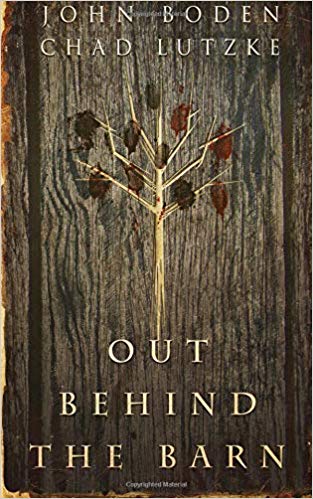Out Behind the Barn
John Boden and Chad Lutzke
October 2018
Shadow Work Publishing
Reviewed by William Grabowski
Teenaged Davey and younger Ronny reside with old chain-smoking Miss Maggie, and for as long as they can remember shared the tidy two-story house in the boonies with infrequent others, lost, lonely, and seemingly broken, brought home in Maggie’s rattling pickup truck. These strangers — such as pretty Miss Rose — chip in with chores, take meals at the kitchen table, and occasionally hang out with the boys, but none seem capable of meeting whatever obscure standards demanded by their elder. After these “failures,” affairs return to “normal.” Miss Maggie reads the boys to sleep, prepares meals, and assigns tasks common to all rural households.
Until one night, when Maggie brings home Ben, an adult whom, after a while, seemingly earns her approval. Ben gets along with the boys, but senses all is far from “right,” both in the house and even in himself. Questioning Davey about the old woman (whose personal library, forbidden to the boys, includes Charles Fort’s Book of the Damned, and tomes on Appalachian folk religion), Ben initially learns little, but is shown aspects of the property charged with a mix of the uncanny, fetishism, and what might be physical emblems Maggie employs to cope with the overwhelm of anxiety disorder or something wholly Other:
Red flannel strips and cotton swatches. Shreds of green material and billowing streamers of yellow fabric dotted the fence line. Tied around the mailbox post was a garland of denim and corduroy. A sun-faded trucker hat that may have been blue once bobbed in the light breeze from the cloth strip that tethered it there.
Ben notes a power-line running from the barn and down the road, veering into bordering woods where trees are marked with yet more cloth and denim — even a few socks. Despite this distinct unease, and the (unknown) whereabouts of Miss Rose, we hear Ronny’s apparently sincere praise for Maggie who “…sings to me at bedtime, she makes cakes and pies and the best cookies I ever did eat!”
Eventually, Ben, the boys, and Maggie become a family of sorts. Davey spends free time reading westerns and Bradbury, while Ronny watches TV, plays with wooden toy men and — warned one day by Maggie to stay out of the house — joins Davey in the barn for an on-the-spot trivia game covering Lovecraft, Lynch, The Red Badge of Courage, and other literary topics. When Ben learns not only what’s driving Maggie, but what she’s been doing to assuage a loss nearly too terrible to describe, he pursues closure that can only be described as biblical.
Boden and Lutzke combine their prose into a hybrid remarkably singular, and shift easily from delicate nuance to physicality brutal and black. Life can annihilate security, heart, and so much more; render us missing persons in our own lives, knowing an end to hope doesn’t always mean the end of existing.
It’s difficult to imagine a novella so haunted and emotionally ravaged as Out Behind the Barn had such ambiguous — even, for a while, ambivalent — origins. The truism about an author being a poor judge of their own work remains exactly that: true. Co-author Boden began a 3,000-word story, “Maggie’s Farm,” collected two rejections, and held back from Lutzke’s suggestion to expand the piece. Offering assistance, Lutzke added several thousand words; both authors busied themselves with other commitments, finally retooling and rewarding us with the book at hand. Dying is easy. Writing is hard.









